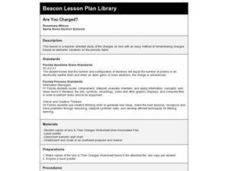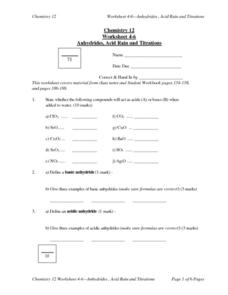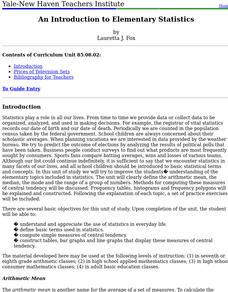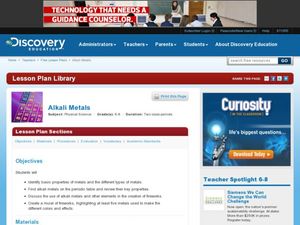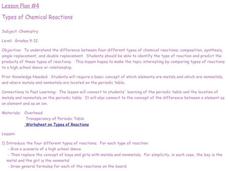PhET
Radioactive Dating Game
Uranium 235 has a half-life of over 700 million years and is the fuel used in the atomic bomb dropped on Hiroshima, Japan. Pupils see the half-lives and decay rates of Carbon-14 and Uranium-238. They also take measurements of these two...
Curated OER
The Carbon Cycle
Fifth graders examine the carbon cycle, periodic table, and photosynthesis and respiration. They analyze the periodic table and how it is organized, then complete the "Elementary, Dear Watson" worksheet. Students then examine a carbon...
Curated OER
Isotopes of Pennies
Students demonstrate that isotopes of an element have different masses. They illustrate atomic mass and neutrons. The periodic table is examined in length. Display of a collection of atoms is surveyed.
Curated OER
Are You Charged?
Fourth graders study the charges on ions and familiarize themselves with a quick way to remember charges based on location of elements on the periodic table. They complete a worksheet and share their answers with the class.
Curated OER
Atomic Theory
An extremely thorough presentation walks new chemists through the basics of matter. There really isn't a unifying theme, however So many topics are covered: forces, elements, atomic structure, chemical properties, compounds, quarks,...
Curated OER
What is Radon?
Learners read an article about radon and its properties. They examine a periodic table and identify the numbers surrounding an element. They discuss the harmful and helpful effects of radiation.
Curated OER
Elements Compounds and Mixtures
In this science activity, students apply science basic knowledge of chemistry to the puzzles that are listed for the four parts of the sheet while focusing upon the identification of a metalloid.
Curated OER
Anhydrides, Acid Rain and Titrations
In this chemical compounds worksheet, students determine is compounds will act as acids or bases when added to water. Students compare basic, acidic, and amphoteric anhydrides. This worksheet has 15 fill in the blank, 2 short answer...
Curated OER
An Introduction to Elementary Statistics
Students explain and appreciate the use of statistics in everyday life. They define basic terms used in statistics and compute simple measures of central tendency.
Curated OER
Matter: All That "Stuff"
In this chemistry activity, students learn about matter, including atoms, electrons, protons, neutrons, compounds and chemical properties. They use this information to answer the 10 questions on the activity. The answers are on the last...
Curated OER
The Photoelectric Effect in Photocells
Illuminate your physics class with this examination of a photovoltaic cell. Teach the structure and operation of the device using a diagram. Then make a human-powered, larger-than-life sized model of a PV cell. Learners become electrons...
Curated OER
The Alkaline Earth Metals
High schoolers investigate the characteristics of alkaline earth metals. In this alkaline earth metals lesson plan, students experiment with a variety of alkaline earth metal compounds and perform tests to observe their properties. High...
Virginia Department of Education
Solution Concentrations
What happens when you combine 6.022 times 10 to the 23 piles of dirt into one? You make a mountain out of a mole hill. Scholars use dehydration to obtain percent composition and then calculate the molarity of the original...
Cornell University
What Happens When We Excite Atoms and Molecules?
Excited atoms lead to exciting lessons! Learners use heat and light to excite both atoms and molecules. They display their learning in the form of Bohr models depicting the excited state of the atoms.
Curated OER
All About Circuits ~ Atomic Structure
In this interactive Internet assignment, physical science investigators answer 11 questions about the atom, the subatomic particles, and atomic structure. They can click on "Reveal Answer" to discover if they are correct. They also...
Teach Engineering
Gumdrop Atoms
There's nothing sticky about the resource, unless you count the gumdrops! Scholars create a model of a lithium atom, complete with protons, neutrons, and electrons. It's just that these models are made with gumdrops and toothpicks.
Curated OER
Alkali Metals
Young scholars explore the unique properties of alkali metals. In this chemistry lesson, students create a mural of fireworks display after researching its different element components. They write a brief description about an alkali...
Curated OER
Semiconductors
Young scholars investigate the properites of a semiconductor device known as a diode. They recognize a diode as a one way conducting device. They describe alternating current and the use of a diode to convert it to direct current....
Curated OER
Acid/Base Equilibrium
In this equilibrium worksheet, students solve nine problems related to acids, bases, buffers, ionization and calculations of pH.
Curated OER
The Elementary Particle Masses
In this elementary particle mass worksheet, students calculate the mass of elementary particles in kilograms and million electron Volts. Students solve 4 problems finding Top Quark mass, total quark mass of a proton and Strange Quark mass.
Curated OER
Exam Review: Chemistry Calculations
In this chemistry calculations review worksheet, high schoolers solve 33 review problems about titrations, precipitates, pressure and volume of gases, combustion reactions, heat of combustion, molar concentrations and molecular formulas.
Curated OER
Types of Chemical Reactions
Students understand the difference between four different types of chemical reactions: composition, synthesis, single replacement, and double replacement and identify the type of reaction and predict the products of these types of...
Curated OER
Atomic Structure and Quantum Theory
Students are introduced to the structure of an atom and Dalton's atomic theory through a short video and mini-lecture. They also take a look at the weight of mass and become familiar with the idea of quantum theory
Curated OER
ART- LANGUAGE OF SYMBOLS
Students discuss how color construct meaning in art. They will demonstrate a technical knowledge and creative use of formal elements and principals of design. Students then discuss the way their selection of color contributed to their work.





